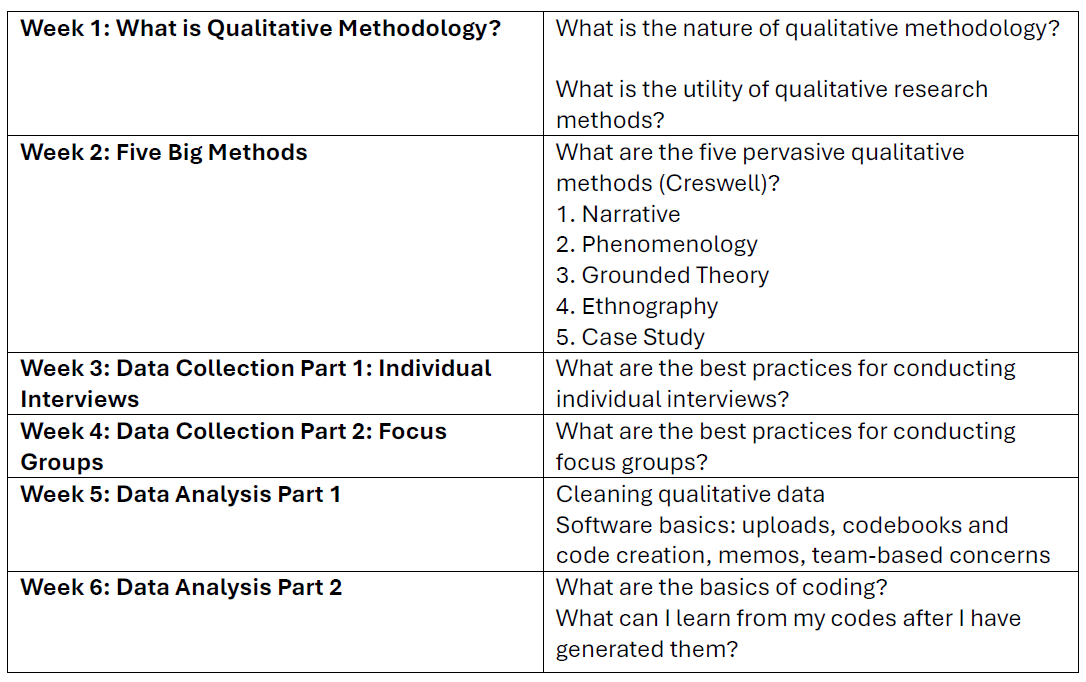Overview
The Qualitative Research Unit (QRU) is a research methodological unit within the Division of General Internal Medicine (GIM), directed by Sarah Young, MSW, Ph.D., Associate Professor of Social Work Research in Medicine, and David Scales, M.D., Ph.D., Assistant Professor of Medicine.
The vision of the QRU is to establish Weill Cornell Medicine as a nationally recognized institution in the dissemination of high-quality qualitative research within medicine and the health sciences by providing training, mentorship, and rigorous support for such research endeavors.
The QRU's mission is to offer high-quality qualitative methods expertise that is affordable, accessible, and responsive to the needs of the Weill Cornell Medicine community and beyond. We aim to support faculty and research staff in developing their capacity to conduct rigorous qualitative research and to promote the use of qualitative methods in addressing complex health and medical research questions.
QRU Team

Assistant Professor of Medicine

Associate Professor of Social Work Research in Medicine
Services
The QRU offers consultative services, equipment, and facilitation to support investigators in planning and conducting qualitative studies. We specialize in structured and semi-structured interviews, web-based qualitative data collection, direct observation of behavior, and focus groups.
Our support spans the entire research process, including design, implementation, data analysis, and reporting, as well as post-research assistance with reports, manuscripts, and grant preparation. We tailor our support to the individual needs of the researcher or research team.
Additionally, we provide resources and support for researchers looking for funding for qualitative projects and funding opportunities. Our services include responding to journal reviews, writing proposals, and offering methods to effectively design studies.
We also offer a six-week Qualitative Research Basics course run by Dr. Sarah Young for Research Assistants and staff involved in research. Upon completion, participants may elect to receive certification through the completion of an additional research project. This course is free for faculty and staff in the Division of GIM, with priority given to research faculty. Fees apply to those outside of GIM.
Sample outline for the Qualitative Research Basics course:

Opportunity
For qualitative research services and consultation, please send us an email at qru-admin@med.cornell.edu for research project intake, planning, and execution.
Testimonials

FAQs
What is qualitative research?
Qualitative research is a methodology for scientific inquiry that emphasizes the depth and richness of context and voice in understanding social phenomena.
This methodology is constructive or interpretive (Lim, 2023) aiming to unveil the “what,” “why,” “when,” “where,” “who,” and “how” (or the “5W1H”) behind social behaviors and interactions, rather than merely quantifying occurrences. In the exploration of the subjective experiences, perspectives, and meanings that individuals attribute to their social world, qualitative research embraces openness and employs a variety of equivalent methods such as open-ended questions, in-depth and focus group interviews, and participant observation, ensuring a comprehensive exploration of the phenomena.
Read more about qualitative research here.
When will qualitative research add value to my research?
Understanding the differences between qualitative data and quantitative data is crucial to understanding the value of qualitative data in the research. See the table here, which distinguishes how qualitative inquiry differs from quantiative inquiry.
What is the IRB approval process for qualitative research protocol (interviews, focus groups, ethnography)?
To understand the IRB approval process for qualitative research protocol, please visit Weill Cornell Medicine Research Team Resources, which will provide you with the basic information to get your IRB submission started. Protocol templates for Social, Behavioral, or Educational (SBE) research are best suited for qualitative research and can be found here.
What are the next steps after gathering qualitative data?
After collecting qualitative data, open-ended inquiry methods, the mainstay of qualitative techniques, are essential in formative, hypothesis-generating research for exploring contextual factors and rationales for risk behaviors that do not fit neatly into predefined categories.
In program evaluations, qualitative methods can assist the investigator in diagnosing what went right or wrong as part of a process evaluation or in troubleshooting why a program might not be working as well as expected. When designing an intervention, qualitative methods can be useful in exploring dimensions of acceptability to increase the chances of intervention acceptance and success, or helping to define outcome measures to be used in a later quantitative study. Read more about how to approach qualitative data analysis here.
How can I start the process of analyzing qualitative data?
Analyzing qualitative data can be a rewarding process, as it helps uncover deeper insights into people's experiences, emotions, and motivations.
Here are the key steps to get you started:
- Gather and Collect Data: Begin by collecting your qualitative data. This can come from various sources such as interviews, open-ended survey responses, focus groups, observations, and documents.
- Organize and Structure Data: Once you have your data, organize it in a way that makes it manageable. This might involve transcribing interviews, categorizing responses, or digitizing handwritten notes.
- Coding the Data: Coding involves labeling sections of your data with tags or codes that represent different themes or concepts. This helps in identifying patterns and making sense of the data. You can do this manually or use software tools like NVivo or Atlas.
- Analyze the Data: Look for patterns, themes, and insights within your coded data. This step involves interpreting the data to understand the underlying meanings and relationships. Techniques like thematic analysis, content analysis, or narrative analysis can be useful.
- Iterate: As qualitative research is inherently interpretive, it requires the researcher(s) to reflect on their processes in recursive, iterative re-coding and re-analysis of their data to understand how their prior perspectives and viewpoints may contribute to or detract from their analysis methods.
Read more about analyzing qualitative data here.
Contact Information
Please contact our team via email at qru-admin@med.cornell.edu for qualitative research services.

